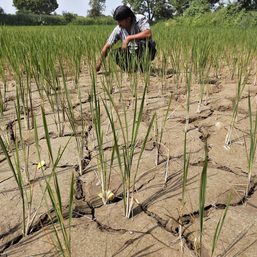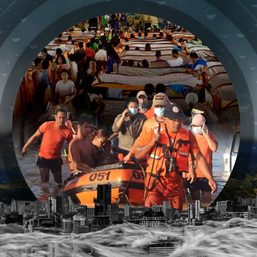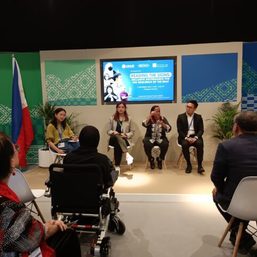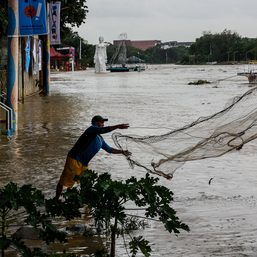SUMMARY
This is AI generated summarization, which may have errors. For context, always refer to the full article.
![[OPINION] Fostering resilient coastal and rural communities in the post-pandemic era](https://www.rappler.com/tachyon/2022/02/rural-coastal-development-february-9-2022.jpg)
It is heartwarming to see that people in Siargao have supported each other and have set up community kitchens, as reported in Rappler’s recent article “Community kitchens help Siargao folk to get through Odette crisis.” It demonstrates that civil society can do much good in times of upheaval and heightened uncertainty. Nevertheless, Super Typhoons Odette and in 2013 Yolanda, have also highlighted the persistent vulnerabilities of coastal communities in the Visayas.
Food security, access to freshwater, as well as electricity provision are all jeopardized in the weeks after natural disasters. More worryingly, climate experts warn that typhoons, floods, and droughts will occur more frequently and will be more intense in the decades ahead. And coastal communities in countries like the Philippines and Bangladesh will continue to bear the brunt of climate change impacts. The IPCC stated that “Coastal areas will see continued sea level rise throughout the 21st century, contributing to more frequent and severe coastal flooding in low-lying areas and coastal erosion. Extreme sea level events that previously occurred once in 100 years could happen every year by the end of this century.” In the 2021 long-term climate risk index compiled by German Watch, which measures the impact of extreme weather events between 200o and 2019, the Philippines occupies the 4th rank, behind Puerto Rico 1st, Myanmar 2nd, and Haiti 3rd.
Therefore, it is necessary to strengthen coastal governance. The alternative, massive outmigration to Davao, Cebu, and Manila would put more pressure on the already overburdened urban spaces and labor markets. Would there be enough decent jobs for all the newcomers in the face of increasing automation, artificial intelligence, and continuous corporate objectives to optimize manufacturing and services? I propose four areas for policy refinements, based on my research in rural, coastal communities of Guimaras, Iloilo, and Palawan as well as in Southern Thailand.
1) What about compensating rural, coastal communities for activities culminating in climate adaptation and mitigation? As Philippine farming and fishing modernize, rural households need more alternative activities and green-growth jobs. Projects like mangrove planting and rehabilitation, constructing renewable energy facilities, beach and river clean-ups, and tree planting would all be beneficial for both communities and the natural environment. One could think about direct compensations, but also about incentives and conditions as part of the Pantawid Pamilyang Program. Furthermore, employing and compensation people for valuable work done is more dignifying and satisfying than a universal basic income (UBI) whereby people might get bored and ask themselves what their contribution to society is.
2) To improve food security and access to fresh water it is imperative to expand strategic water and food reserves as well as rapid logistical support mechanisms in the Visayas (Tacloban, Bacolod, Iloilo), Mindanao (Surigao, General Santos, Zamboanga), and Palawan. This would enable people to reach remote locations quicker and alleviate the plight of the most vulnerable communities. Furthermore, modern rainwater harvesting technologies are more sustainable in the long run compared to digging wells, leading to more soil salinization and thus reduced agricultural opportunities in coastal areas. More generally, agriculture and fisheries deserve more attention from policymakers.
3) At times there is more wealth than we anticipate. Many villages are blessed with remittances from OFWs. Of course it is impossible and amoral to force households to decide how to spend their remittances, but various financial incentives could be directed to foster relatively more job-generating allocations of remittances. Ideally, such incentives would be aligned with the needs of coastal municipalities, for instance business opportunities that are not related to fishing and aquaculture to reduce extreme-weather risks.
4) As reported in the article on Siargao, the region “started to bounce back in mid-September 2021” after the government managed to increase the vaccination rate, yet Odette devastated “its tourism and agriculture sectors.” It is clear that, these days, socio-economic planning requires plan Bs and even Cs. Super typhoons, pandemics, and global economic shocks have profound impacts on rural economies. Lockdown measures pushed 3.9 million Philippine people into poverty between January and June 2021, increasing the poverty rate to 23.7%. A narrow focus on tourism or fisheries and aquaculture does not suffice to improve coastal livelihoods. We need more holistic and flexible approaches. When a calamity dramatically changes socio-economic opportunities, mayors could ask barangay captains, NGOs, government agencies, and companies, to brainstorm together whether to pursue plan A or seek plan B in order to avoid a rise in poverty levels. Also, promoting conversations between farmers and fishers would culminate in better coordinated local and regional development plans.
The Philippines and other Southeast Asian countries are currently planning for the post-pandemic era. Borders will gradually open up and newspapers will resume publishing rosy economic forecasts, yet we must be acutely aware that another shock will eventually emerge. We know that a stock market collapse will affect the real economy again and that a super typhoon will again hit the Philippines; we just don’t know exactly when. As The Economist pointed out December 18, 2021: “The era of predictable unpredictability is not going away.” – Rappler.com
Dr. Edo Andriesse is an associate professor at the Department of Geography, Seoul National University, Republic of Korea. He teaches a wide range of human geography courses and his research interests are in rural, coastal development in Southeast Asia. His publications can be found here.
Add a comment
How does this make you feel?

![[OPINION] In a changing climate, how do we ensure safety and health at work?](https://www.rappler.com/tachyon/2024/04/Climate-change-safety-workers-April-25-2024.jpg?resize=257%2C257&crop_strategy=attention)




There are no comments yet. Add your comment to start the conversation.